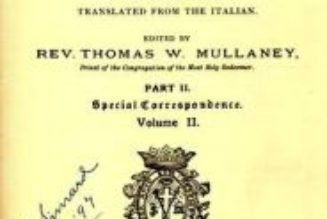, July 8, 2021

Jesus sends the Apostles out two by two with next to nothing in the Gospel for this Sunday, the Fifteenth Sunday in Ordinary Time, teaching them, and us, a crucial lesson in freedom and happiness.
The two go together — freedom from the traps of the devil and happiness in Christ.
What Jesus gave his apostles is of a piece with what he denied them.
What he gave them was “authority over unclean spirit.” At the same time, “He instructed them to take nothing for the journey but a walking stick — no food, no sack, no money in their belts.” Instead, they were to risk everything, placing their fate into the hands of ordinary human beings.
In this, Jesus is only asking the Apostles to follow his own example. The divine Second Person of the Trinity saw fit to leave behind all of the riches of heaven and risk everything, placing his fate into our hands. He came to us with nothing but his message of repentance and his announcement of the Kingdom of heaven.
When the Apostles relinquished their own power, God’s power could work through them with great results. “The Twelve drove out demons and anointed them with oil many who were sick and cured them,” the Gospel says.
He gave us the same gift and the same instructions.
When we are baptized we vow to “reject sin, so as to live in the freedom of God’s children.”
The Apostles show what the freedom of God’s children looks like — giving up everything. To this day, separating ourselves from riches, and that definitely includes the consumerist culture that surrounds us everywhere in America, is obligatory to enter the kingdom of heaven.
We vow to reject “the glamour of evil and refuse to be mastered by sin.”
Satan is always enticing us with empty promises and superficial beauty. For Adam and Eve it was the forbidden fruit which looked “good for food,” “a delight to the eyes” and “to be desired to make one wise.” For us, it is the life of self-centered pleasure seeking, escapist distractions, and asserting our own will over God’s.
We also vow to reject “Satan, father of sin and prince of darkness.”
Our prayer says “Our Father who art in heaven … thy kingdom come.” But our actions too often build up the principalities of this world. We get tricked into become missionaries for the wrong kingdom by presenting an image of material success and worldly satisfaction in our homes, workplaces and on social media that accords with the father of sin instead of Our Father.
“Let the proud seek and love earthly kingdoms,” St. Augustine wrote, “but blessed are the poor in spirit for theirs is the Kingdom of heaven.”
Never believe the lie that Christianity leaves people feeling trapped and unhappy. The world does that.
In the Second Reading, St. Paul tells the Ephesians what their membership in the kingdom of heaven looks like.
With Christ, we are blessed “with every spiritual blessing in the heavens.” We were chosen “before the foundation of the world” and adopted by Jesus Christ. He “lavished upon us” the “glory of his grace.” We were “sealed with the Holy Spirit,” and destined for eternal life in glory.
This is all possible, because of our “redemption” by the blood of Christ, St. Paul says twice the reading. Keep in mind what “Redemption” means. The one who is redeemed is previously a slave.
I love the way Myles Connolly puts it in his novel Mr. Blue, in which the title character tells the narrator that he is “lucky” that he is a Christian. Mr. Blue lives like the Apostles in Sunday’s Gospel, on top of a skyscraper, owning nothing but the bare necessities. He explains what he does have, though, in a speech on top of a skyscraper in New York City.
“Without Christ we would be little more than bacteria breeding on a pebble in space or glints of ideas in a whirling void …. Because of him, I can stand here out under the cold immensity and know that my infinitesimal pulse-beats and acts and thoughts are more importance than this whole show of a universe.”
Because of Christ, he says, “My hand, my feet, my poor little brain, my eyes, my ears, all matter more than the whole sweep of these constellations!” and motions to the star-filled sky above.
God chose us to bring that freeing message to the world.
St. Thomas Aquinas in his commentary on Ephesians points out that God’s choice of us “neither has nor can have any cause but the will of God alone.” His only motive for choosing us is simply because he wants “to communicate the divine goodness to others.”
You need look no further than the First Reading for an example.
Amos explains that he is no great man. Before he was a prophet, he was a shepherd and a dresser of sycamores — a seasonal agricultural worker.
But as lowly as Amos may have been in the eyes of the world, he is a huge figure in the kingdom of God. When God’s chosen people divide into two factions, in which Israel to the north has apostatized and Judah has stayed faithful in the south — “The Lord took me from following the flock, and said to me, Go, prophesy to my people Israel,” Amos says.
He confronts the powerful priest at Bethel, who leads worship of a golden calf and the great priest is threatened enough by Amos to send him into exile.
Like Amos, like the Apostles, like Jesus himself, we need to break out of our comfortable routines.
Politely but persistently, invite others to Bible studies, to conferences, to Mass and to RCIA. Don’t hesitate — the world doesn’t. A warped, constricted view of the human person is promoted endlessly by our schools, retailers and the media such that any opposition is looked on as extremism.
But even as the world aggressively imposes its beliefs and mocks anyone who disagrees, Christians fall for the trap of thinking that we are the intolerant ones and that it is religion that constricts freedom and happiness.
Nothing could be further from the truth. Without Christ, our neighbors are enslaved to a demanding cult that requires conformity to selfish and empty desires. They are being tricked into a lifestyle that will leave them miserable for eternity.
Jesus himself gave us our mission to offer them a truer, freer, happier way.
Tags: 15th Sunday in Ordinary Time Year B, prayer, Suinday Gospel, Sunday Readings
Never miss a post! Subscribe below to our weekly newsletter.
Related
Join Our Telegram Group : Salvation & Prosperity




